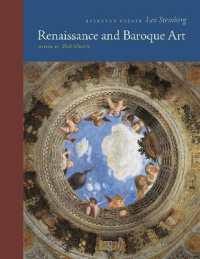- ホーム
- > 洋書
- > 英文書
- > Religion / Ethics
Full Description
Polarization between political religionists and militant secularists on both sides of the Atlantic is on the rise. Critically engaging with traditional secularism and religious accommodationism, this collection introduces a constitutional secularism that robustly meets contemporary challenges. It identifies which connections between religion and the state are compatible with the liberal, republican, and democratic principles of constitutional democracy and assesses the success of their implementation in the birthplace of political secularism: the United States and Western Europe. Approaching this issue from philosophical, legal, historical, political, and sociological perspectives, the contributors wage a thorough defense of their project's theoretical and institutional legitimacy. Their work brings fresh insight to debates over the balance of human rights and religious freedom, the proper definition of a nonestablishment norm, and the relationship between sovereignty and legal pluralism.
They discuss the genealogy of and tensions involving international legal rights to religious freedom, religious symbols in public spaces, religious arguments in public debates, the jurisdiction of religious authorities in personal law, and the dilemmas of religious accommodation in national constitutions and public policy when it violates international human rights agreements or liberal-democratic principles. If we profoundly rethink the concepts of religion and secularism, these thinkers argue, a principled adjudication of competing claims becomes possible.
Contents
Introduction, by Jean L. Cohen Part I: Freedom of Religion or Human Rights 1. Religious Freedom and the Fate of Secularism, by Samuel Moyn 2. Religion: Ally, Threat, or Just Religion?, by Anne Phillips 3. Regulating Religion Beyond Borders: The Case of FGM/C, by Yasmine Ergas 4. Pluralism vs. Pluralism: Islam and Christianity in the European Court of Human Rights, by Christian Joppke Part II: Non-Establishments and Freedom of Religion 5. Rethinking Political Secularism and the American Model of Constitutional Dualism, by Jean L. Cohen 6. Is European Secularism Secular Enough?, by Rajeev Bhargava 7. State-Religion Connections and Multicultural Citizenship, by Tariq Modood 8. Breaching the Wall of Separation, by Denis Lacorne 9. Transnational Nonestablishment (Redux), by Claudia Haupt Part III: Religion, Liberalism, and Democracy 10. Liberal Neutrality, Religion, and the Good, by Cecile Laborde 11. Religious Arguments and Public Justification, by Aurelia Bardon 12. Religious Truth and Democratic Freedom: A Critique of the Religious Discourse of Anti-Relativism, by Carlo Invernizzi Accetti 13. Republicanism and Freedom of Religion in France, by Michel Troper Part IV: Sovereignty and Legal Pluralism in Constitutional Democracies 14. Sovereignty and Religious Norms in the Secular Constitutional State, by Dieter Grimm 15. Religion and Minority Legal Orders, by Maheila Malik 16. The Intersection of Civil and Religious Family Law in the U.S. Constitutional Order: A Mild Legal Pluralism, by Linda C. McClain 17. Religion-Based Legal Pluralism and Human Rights in Europe, by Alicia Cebada Romero Conclusion: Is Religion Special? Contributors Index

![The Man with Kaleidoscope Eyes [Trade Paperback]](../images/goods/ar/work/imgdatag/18039/1803945435.JPG)






